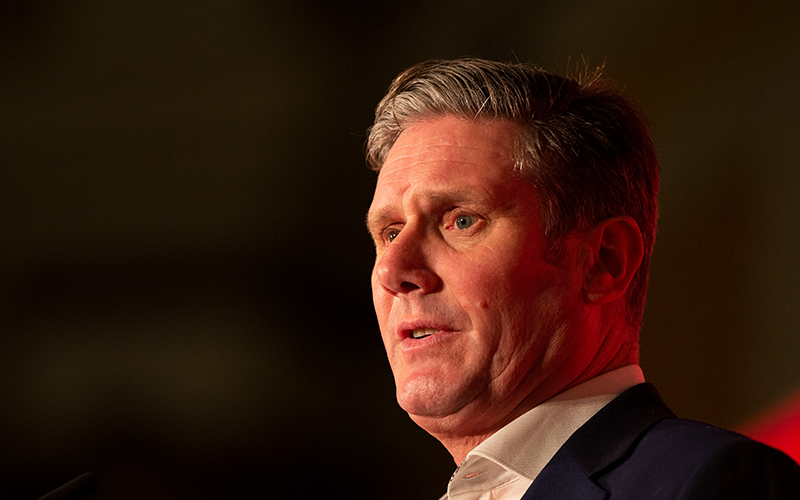The leader of the opposition promised to uphold UK standards and support sustainable public sector food in a significant speech on food and farming. Nick Hughes reports.
Sir Keir Starmer has pledged that a Labour government would uphold UK food standards in future trade deals as he set out his vision for food and farming.
In a keynote speech delivered on Tuesday (February 21st) to the National Farmers Union’s (NFU) annual conference, Starmer also promised Labour would reform public sector procurement by ensuring that 50% of all food purchased is produced locally and sustainably.
Interest in Labour’s proposed policy programme is growing as national polls put the party well ahead of the Conservatives. A poll published this week by Redfield Wilton put the party on a 51% vote share compared with 24% for the Conservatives.
Starmer and his top team have made significant efforts to win favour among business leaders in recent months and his speech at the NFU conference – the first in-person appearance by a Labour leader since 2008 (Starmer delivered a speech remotely two years ago when the conference was online) – marked an attempt to sell Labour’s vision to farmers, a group that sits outside of Labour’s traditional cohort of voters.
Perhaps most notable was the Labour leader’s promise of a different approach to trade in which he pledged to “protect high British standards, not water them down”.
The government has faced criticism from farmers and environmental groups for failing to require that food imports meet UK standards for animal welfare and the environment under the terms of new trade deals with the likes of Australia and New Zealand.
Labour, by contrast, has previously supported a campaign by the NFU and environmental groups to put higher food standards into law.
Henry Dimbleby, author of the independent national food strategy, described the lack of protection for domestic standards as “the biggest missing piece” in the government’s food strategy response. Dimbleby had wanted the government to define minimum standards for future trade deals in areas such as the environment and animal welfare, a call supported by the climate change committee and the trade and agriculture commission (TAC), the independent body established by the government to scrutinise and advise on trade deals.
The government has also faced criticism for its lax approach to monitoring imports for food safety and hygiene risks. Physical checks on high-risk foods at the border have consistently been delayed since the end of the Brexit transition period prompting fears of a future horsemeat-type scandal. In an interview with The Guardian published at the weekend, NFU president Minette Batters accused ministers of a “dereliction of duty” in failing to ensure food and other agricultural imports were safe, adding that the government had failed to learn the lessons of the horsemeat scandal.
For his part, Starmer promised a better trading relationship with the European Union following a period post-Brexit when businesses selling to the continent have faced a raft of administrative barriers. The latest trade data from the Food and Drink Federation for Q3 2022 showed the value of food and drink exports to the EU remained 1.6% lower than in 2019, in spite of soaring price inflation and a recovery in exports since the pandemic.
Another Starmer pledge – that 50% of all food bought by the public sector will be produced locally and sustainably – also caught the eye. However, unlike with trade standards, the proposal doesn’t put clear water between Labour and Conservative policy. The government proposed its own new set of food procurement standards for the public sector last summer, a key plank of which is a target for 50% of public sector food spend to go on food produced locally or certified to higher environmental production standards. The plan was broadly welcomed by green groups, however a government consultation paper failed to spell out how locally sourced and higher environmental standards would be defined.
Starmer’s speech was also light on detail and the Labour leader will know there is work to do to put flesh on the bones of his food and farming policies in order to get a fair hearing from farmers. He will face challenges too in spelling out a vision for food and farming that mollifies both farmers and campaigners. Responding to his address in Birmingham, Green Alliance executive director Shaun Spiers said it was “a good speech on farming and food resilience – but we now need Sir Keir to turn his attention to the nature crisis and the role farming will play in restoring health to our natural world”.
What his trip to Birmingham did serve to do is position the Labour leader as someone interested in the concerns of farmers, and rural voters more generally. It did not go unnoticed among NFU bigwigs that Rishi Sunak did not attend the conference in-person (farming minister Mark Spencer and Defra secretary of state Thérèse Coffey represented the government with Sunak supplying a video address). Batters said of Sunak’s absence: “I think it’s a real shame that he isn’t there himself, but the leader of the opposition is there. I think that speaks volumes in itself. You know, they [Labour] want to engage.”
Securing the rural vote has traditionally been an uphill task for Labour leaders. It may yet prove so for Starmer too, but if the polls are to be believed it’s right that his policies are starting to attract the interest – and scrutiny – they deserve.














